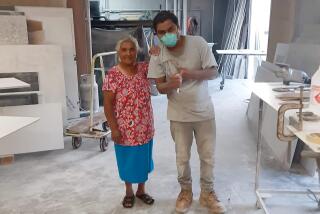Ex-Shiley Employees Allege Lax Procedures : Courts: In statements for a Texas case, they say valves were recycled, serial numbers changed at Irvine plant. The firm denies accusations.
- Share via
SANTA ANA — Three former employees at Shiley Inc., the onetime Irvine medical device manufacturer, said the company recycled thousands of poorly manufactured artificial heart valves--and altered their serial numbers--to save money.
“After Pfizer took over the company (in 1979), things changed and it seemed that the company’s efforts were concentrated strictly on more production and not quality control,” wrote former Shiley welder Wayne Runnells in a November, 1990, affidavit obtained by The Times. The affidavit came from a Texas court case that was resolved in 1991 before going to trial.
“A large number of these valves had bad welds and had cracks in the weld and could not be repaired,” he added.
These and other accusations, contained in the notarized statements prepared in 1990 and 1991, are not part of an ongoing Orange County Superior Court trial in which Ruth Barillas, 54, of La Mesa in San Diego County is suing Shiley and its parent company, Pfizer Inc. in New York, for emotional distress.
Though the Bjork-Shiley artificial heart valve she had implanted in 1980 has not malfunctioned, Barillas said she lives in constant fear that the valve’s welded struts will someday snap and cause her to suffer a fatal heart attack.
Shiley spokesman Robert Fauteux staunchly denied the allegations found in the affidavits, adding that the former employees have not been cross-examined by company attorneys.
“We question the propriety of publicizing materials that have not been admitted in court,” Fauteux said, referring to the Barillas trial.
But the affidavits of former Shiley welders Runnells and Harvey P. Hilman and assembler Angeline Bonnie D’Alessandro offer a glimpse at the accusations Shiley could face in future trials that would focus on the safety and integrity of its manufacturing procedures, or so-called product liability cases.
Though Fauteux declined to comment on specific charges made by the workers, he said that the company is prepared to “address those issues” if the Barillas trial reaches a second phase. A second phase would occur if the jury finds the company guilty of fraud, and would center on how much money Barillas would be awarded.
Even so, Fauteux said, the three affidavits would not be part of a second phase, though more formal depositions from disgruntled, former employees could be presented by the plaintiff.
“We would present evidence (at that time) that would clearly and specifically respond to these allegations,” he said.
That second phase could begin as early as next week. Attorneys for Shiley rested their defense on Monday, with closing arguments scheduled to begin Wednesday. The jury is likely to get the case on Thursday morning.
During the four-week Barillas trial, the company has defended the heart valve, saying that it is safe, though federal officials have said it has been responsible for at least 250 deaths.
Shiley attorneys argue that the valve, while in production, was the safest such device on the market, even considering the occasional strut fractures that still occur at a rate of three a month.
About 83,000 Shiley valves were implanted in heart patients from 1979, when the company received federal approval to sell them, to 1986, when it ceased making them. Of the 501 valves that government regulators know to have fractured, 164 recipients have lived because either the fracture was not complete or the patients were rushed to hospitals in time to receive new heart valves.
Shiley signed in 1991 with the nonprofit medical identification organization Medic Alert in Northern California, but critics contend that a full-scale effort to identify all recipients of its valves has not succeeded and that the number of those who have died from their malfunction may be as high as 900 worldwide.
After three recalls of the valve and numerous attempts to solve the strut fracture problems, Shiley was forced to stop selling them seven years ago because of “negative publicity,” the company said at the time.
The company stopped production just three weeks before a Food and Drug Administration advisory committee was scheduled to begin reviewing data on the valve. Although Shiley no longer makes medical devices--it sold its product line to a Milan-based division of the Fiat Group for an undisclosed sum in 1992--it exists as a non-manufacturing subsidiary of Pfizer to coordinate the legal defense and medical research surrounding the Shiley heart valve.
The company denies that it ever permitted substandard manufacturing processes at its Irvine facility.
However, a Huntington Beach man claims in a separate product liability suit against Shiley that the company was guilty of shoddy manufacturing. Richard Thomas, 45, said he had his Shiley valve replaced for a safer model in 1992 at the urging of his cardiologist, although the Shiley device was working well.
Six months later, however, he said he was told that the removed Shiley valve had already experienced a strut fracture that could have led to it snapping off completely. His suit was filed in February.
“I was very thankful that I listened to my cardiologist,” said Thomas, whose attorneys also represent Barillas. “I didn’t want to do it (have the operation), but now I am overjoyed.”
Thomas and other Shiley critics say the affidavits are a small portion of the voluminous documents that point to scores of alleged misdeeds by Shiley and Pfizer.
For instance, Runnells’ affidavit said that Shiley welders were originally instructed to inspect all valves for cracks or bad welds with microscopes as they came off the assembly line. Rejected valves were placed into small plastic bags with red tags and stored in a separate area, ostensibly to be discarded later.
“When a valve was red tagged, this meant it was scrapped and would not be used anymore,” Runnells wrote. But in 1979, Runnells said, “thousands of scrapped Bjork-Shiley Convexo-Concave heart valves were brought back to the welding room for rework(ing) by me.”
Fellow welder Hilman also said in his 1990 affidavit that he objected to re-welding struts by 1981 when “it seemed a lot of the re-welding of these valves to attempt to fix cracks began to take place.” If cracks persisted after a second welding, he wrote, workers were ordered to buff out cracks until they did not appear anymore.
“I can safely say that we were able to successfully re-weld only one of every 10 valves that had to be re-welded,” according to Hilman.
The three former workers also allege that drug and alcohol abuse was rampant at the Irvine plant and that they were ordered to buff out serials numbers and stamp new ones into the metal sides of the quarter-sized valves. The new stamps were allegedly added in order to hide that rejected valves had been reused.
Hilman said the lax manufacturing procedures finally led him to leave the company in 1984.
“The thought that heart valves that I and others at Shiley had made were being implanted in human hearts was terrifying to me and my conscience was bothering me as to what I was doing at Shiley,” Hilman wrote.
More to Read
Inside the business of entertainment
The Wide Shot brings you news, analysis and insights on everything from streaming wars to production — and what it all means for the future.
You may occasionally receive promotional content from the Los Angeles Times.










